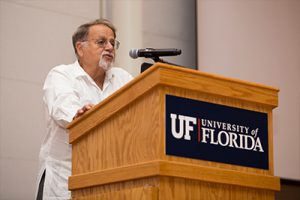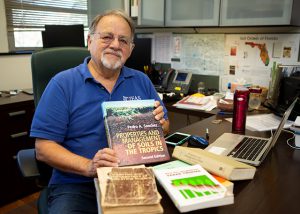- Pedro Sanchez celebrates and pays homage to his Hispanic heritage and cultural history each day by crediting the Latin roots he came from for the passion that inspired him to lead a life’s work dedicated to fighting food insecurity as a pioneer in the field of tropical soils.
- Born in Cuba, he played in red tropical soils, the very dirt that later fueled his groundbreaking research to fighting world hunger and poverty as he worked to enhance and protect degraded soils and increase food production.
- Sanchez is a tropical soils research professor at the University of Florida Institute of Flood and Agricultural Sciences (UF/IFAS) whose passion and life’s work for humanity and the environment has earned him, among many titles past, that of a 2021 Great Immigrant this year.

GAINESVILLE, Fla. — At an early age, Pedro Sanchez expressed a fascination and passion for the soil on which he grew up in Cuba.
More specifically, he was drawn to the deep rust colors of the island’s tropical soil. That same soil that stained his play clothes was where he learned to grow fruit on his family’s farm in Caimito del Guayabal.
“One of my fondest memories as a child is playing with the rich red soil, curious about its color and properties at my family’s business,” he said.

That soil further fueled a curiosity that later transformed into a love for agriculture, and ultimately, a passion for improving the world’s food supply and reducing hunger.
Currently, at UF/IFAS, Sanchez is a research professor of tropical soils in the Soil & Water Sciences Department, and a core faculty of the Institute for Sustainable Food Systems. Sanchez works in this position after a lifetime of conducting research worldwide from Africa to South America, empowering farmers and landowners with research to increase crop yields, working with world leaders to improve public policies and implementing efforts to mitigate the effects of global warming with farming techniques.
Those early childhood beginnings where he watched and learned from his parents to nurture the red soil on their 50-acre farm to grow potatoes, avocadoes and mangoes for export to other countries, are the same moments that led him to a life of research. His father, who held a bachelor’s degree from Louisiana State University and a master’s from Cornell University, was no stranger to seeking science-based knowledge when it came to agriculture.
He often traveled to Florida to obtain seeds and meet with scientists to gather the most updated information to keep the farm successful, the tropical soil of Cuba healthy, and to provide the know-how to help neighboring Cuban farmers increase productivity on their lands.
“My parents also sold fertilizer from our farm all over Cuba, which leads me to another of my favorite memories,” he recalled. “I was just 7 years old when I asked my father if I could travel with him on one of his trips to the United States.”
Those visits were most often to the experiment station in Homestead, the site referred to today as the UF/IFAS Tropical Research and Education Center, said Sanchez. The soils that made for great fun and learning activities later fueled his curiosity as a scientist. He wanted to attend Cornell University and pursue a bachelor’s in agronomy.
“My plan after graduation was to return to Cuba and work at my dad’s company until he retired,” he said.
The latter part of that plan never came to fruition as the Cuban Revolution entered the picture during his freshman year. His family, like many others, lost their properties, businesses and even their homes. While at Cornell University, he took on jobs to pay for housing and tuition.
After his undergraduate education in soil sciences at Cornell University — where he took seminars on starvation in India — Sanchez headed to the Philippines as a graduate student in tropical soils, becoming what he calls “a foot soldier in the Green Revolution,” working on rice. He later earned his master’s and doctoral degrees in soil science from Cornell University.
Among his numerous academic appointments, Sanchez was a visiting professor of tropical resources at the University of California-Berkeley’s College of Natural Resources. He led seminal work over three decades that turned once-infertile soil into productive farmland. His methods for restoring soil fertility using naturally available resources have dramatically increased crop yields for hundreds of thousands of small farmers from Brazil to Africa.
At Columbia University’s Earth Institute, he served as director of the Agriculture and Food Security Center, as a senior research scholar, and as director of the Millennium Villages Project. He was also co-chair of the United Nations Millennium Project Hunger Task Force.
He is a widely published scientist with more than 250 scientific publications. A decorated author who wrote the foundational book, “Properties and Management of Soils of the Tropics” — which is rated among the top 10 best-selling books in soil science worldwide — he is also co-author of “Halving Hunger: It can be done.”
Designated as a pioneer with several honors in the field of tropical soils and agroforestry, Sanchez received the 2002 World Food Prize, agriculture’s equivalent of a Nobel and a MacArthur Fellowship. He was elected to the National Academy of Sciences and the American Academy of Arts and Sciences. He is also the recipient of the International Soil Science Award by the Soil Science Society of America and the International Service in Agronomy Award by the American Society of Agronomy.
Today, Sanchez has built a legacy on the research of tropical soils around the world. He has led teams of scientists to develop techniques that transformed the perception of the tropical soils that once were considered unsuitable for agriculture into productive grounds of food-feeding masses.
For his most recent distinction, Sanchez was named as one of a select group of 2021 Great Immigrants. This one has special meaning as well because it sheds light on his Latin roots, the heritage in which he holds great pride. Led by the Carnegie Corporation of New York, the initiative recognizes immigrants who have made notable contributions to the progress of American society.
-30-
The mission of the University of Florida Institute of Food and Agricultural Sciences (UF/IFAS) is to develop knowledge relevant to agricultural, human and natural resources and to make that knowledge available to sustain and enhance the quality of human life. With more than a dozen research facilities, 67 county Extension offices, and award-winning students and faculty in the UF College of Agricultural and Life Sciences, UF/IFAS brings science-based solutions to the state’s agricultural and natural resources industries, and all Florida residents.
ifas.ufl.edu | @UF_IFAS
 0
0
